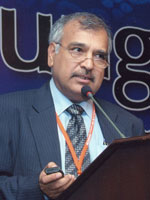Shifting Pakistan's approach to HIV/AIDS
July / August 2012 | Volume 11, Issue 4
As a physician in Pakistan specializing in dermatology and venereology, Dr. Sharaf Ali Shah began encountering HIV/AIDS in the clinic, but realized no one had any idea how extensively the disease was hitting the country, because no reliable surveillance system was in place. His country's health policies, steered by physicians and restrained by low resources, focused on treating the sick rather than devising preventive interventions.

Dr. Sharaf Ali Shah
In order to help, Shah decided he needed new skills. He applied for training under the University of Alabama's Fogarty AIDS International Training and Research Program (AITRP) grant to earn his master's degree in public health. The experience was transformative. "AITRP training changed me from clinician and manager to a researcher," he said.
Today, he uses the skills he learned to conduct research, including surveillance, to train and mentor young scientists and to urge the government to institute HIV/AIDS prevention programs. "The number of people who are interested in public health is growing. Now we have the research, the data," Shah said.
As part of his AITRP training, he received instruction in grant writing, which helped him, with other former AITRP trainees, to secure several multimillion dollar grants from leading global health funders. Since the mid-1990s, Shah estimates about 50 Pakistanis have benefited directly from AITRP. Former trainees now hold important positions in academia, public health, international organizations and non-profit agencies.
Now that Pakistan has data clarifying the state of its epidemic, it is in a better position to formulate intervention strategies, Shah said. Initially, nearly all the country's AIDS cases were in men who had been migrant workers abroad but were sent home after falling ill. More recently, the bulk of new infections are occurring among people who inject drugs. "They are homeless, live on the street and are very mobile, therefore the HIV epidemic also moves. This is a highly dynamic mode of transmission," Shah noted.
Prevention is increasingly regarded as cost-effective and the government has established 10 preventive programs for various infectious diseases. Workers going overseas now receive education about HIV/AIDS.
To view Adobe PDF files,
download current, free accessible plug-ins from Adobe's website.